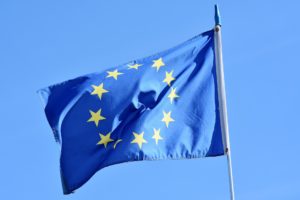Highlights from the Past Weeks
CW 6 / Monday, 6 to Thursday, 9 February: Political Group and Committee Meeting Week;
DATA ACT – COMMITTEE ADOPTS REPORT: The lead Industry Committee (ITRE) in the European Parliament adopted its report on the Data Act on Thursday. The plenary of the Parliament is expected to adopt the report during the session week of 13-16 March (see EP press release).
With the Data Act, the Commission aims to better harness the potential of the data economy in Europe and facilitate the sharing of non-personal data. Among other things, the Data Act requires data owners to share data with users of their products, other companies and government agencies.
The report provides for various changes to the Commission’s draft and addresses some of the Internet industry’s criticisms.
The EP rapporteur, P. del Castillo, wants to reach a political agreement before the summer. Meanwhile, the Council, under the Swedish Presidency, will discuss the fifth compromise draft on 28 February. The Presidency wants to receive the OK from the ambassadors before the end of March (see Politico Pro, Paywall).
EIDAS I – EP READY FOR TRILOGUE NEGOTIATIONS: The lead Industry Committee (ITRE) in the European Parliament also adopted its report on Thursday as well as the mandate for the trilogue negotiations on the new eIDAS regulation. The Council already adopted its General Approach in December.
The new regulation complements the old eIDAS regulation from 2014 and aims to create the legal framework for an EU-wide interoperable EUid wallet. This wallet is intended to create the basis for digital identities that can be used across borders in the EU (see EP press release).
EIDAS II – ARCHITECTURAL AND REFERENCE FRAMEWORK PUBLISHED: The Commission published the Architecture and Reference Framework version 1.0 last week. The ARF gives developers the specifications and requirements to implement the EUid wallet.
According to the ARF’s target list, the wallet will serve as an ID card to access online public services, a digital driver’s licence, a way to access e-health services, proof of professional and educational qualifications, an identifier for digital financial and payment transactions, and a travel document.
ARTIFICIAL INTELLIGENCE – STILL NO AGREEMENT IN EP ON DEFINITION: Politico (paywall) published new collections of compromise amendments – including the definitions (PDF), as well as risky AI practices (Annex II+III – PDF).
The latter includes ChatGPT and art-generating AIs à-la DALL-E-2, which by default (with exceptions) would be classified as high-risk. “Subliminal techniques” used for therapeutic or scientific purposes also fall into the high-risk category.
Risk is defined as “the combination of the probability of an occurrence of a hazard causing harm and the degree of severity of that harm”. The definition of what AI is seems to have been “parked” again (see Politico Pro, Paywall, and Euractiv).
A five-hour meeting of the shadow rapporteurs is scheduled for Wednesday (Agenda, PDF; see Contexte, paywall, FR). The two co-rapporteurs want to reach the end as quickly as possible and see themselves “well within time” to reach a conclusion in this legislative period (see Reuters). A. Voss, shadow rapporteur in the Committee on Civil Liberties and responsible for the opinion in the Committee on Legal Affairs, wants to “take more time for a reasonable result”. (see Table Europe, paywall)
CSAM I – RESPONSIBILITY IN EP PRESUMABLY CLARIFIED: The Internal Market Committee (IMCO) will have shared competencies for some areas of the Commission’s proposal in accordance with Rule 57 of the Rules of Procedure as an associated committee. Specifically, this is about:
- Article 1 (Subject Matter and Dcope), paragraphs 1, 2 and 3(b);
- Article 2 (Definitions), letters a) b) c) d) e) f) g) h) r) t) v) and w);
- Chapter II, Section I (Obligations to Assess and Mitigate Risk), Section II (Obligations to Detect), Section III (Obligations to notify), Section IV (Obligations to Eliminate), Article 19 (Liability of Providers), Article 23 (Contact Points) and Article 24 (Legal Representatives);
- Chapter III (Supervision, Enforcement and Cooperation);
- Chapter V (Data Collection and Transparency Reports); together with the relevant recitals.
This emerges from the proposal of the Conference of Committee Chairpersons to the President of Parliament for the Conference of Parliamentary Group Chairpersons (see Contexte, Paywall, FR)
CSAM II – DRAFT IMCO OPINION: A. Agius Saliba finalised his draft opinion (PDF) in the Internal Market Committee (IMCO) on 8 February.
Saliba has proposed to only allow detection orders for known child sexual abuse material, which can be more easily tracked through so-called hashes, fingerprints for photos and videos. Such orders could also only target hosting services and communications services that can “reasonably be expected to have the technical and operational ability to act”. He also explicitly added an amendment stating that nothing in the regulation should be seen “as prohibiting, restricting or undermining the provision or the use of encrypted services”. Furthermore, he wants to abolish mandatory age verification in app stores. (see Politico Pro, Paywall and Contexte, Paywall, FR)
FREEDOM OF THE MEDIA I – CONFLICT OF COMPETENCE BEFORE SOLUTION: The Conference of Committee Chairs made its recommendation on the distribution of responsibilities for the Freedom of the Media Ordinance on 3 February. The Committee on Civil Liberties (LIBE) will be involved in the work of the Committee on Culture (CULT) in the “Article 57+” format. LIBE is given exclusive and shared responsibilities for Articles 4(2) and 20(3).
As far as the Internal Market Committee (IMCO) is concerned, the Committees have previously agreed on shared competence under Article 57.
The decision of the Conference of Parliamentary Group Leaders is expected at its next meeting, scheduled for 16 February (see Contexte, Paywall, FR)
The all-female team in CULT is still missing the shadow rapporteur of The Left. It currently comprises, in addition to rapporteur S. Verheyen (EPP, DE), P. Kammerevert (S&D, DE), I. Joveva (Renew, SI), D. Riba i Giner (Greens, ES), C. Griset (I&D, FR) and E. Kruk (ECR, PO) (see EP Legislative Observatory).
FREEDOM OF THE MEDIA II – INDEPENDENT AND FLEXIBLE: Feedback from seven Member States on the proposed European Media Freedom Act (EMFA) has highlighted the flexibility and independence of media regulators as key concerns for national authorities. In a document circulated last week, the Member States outlined what they see as points for improvement in the text, including response times, the relationship between the Commission and the new European Media Services Council, personal data and spying programmes (see Euractiv).
FREEDOM OF THE MEDIA III – COUNCIL PRESIDENCY SEES NO URGENCY: “We don’t have any time pressure. We must take the necessary time to delve into “difficult issues” such as the legal basis or European competence, said the Swedish Presidency when presenting its priorities to the Parliament’s Culture Committee on 6 February (video, from 16:41 on). At least they expect to reach a general orientation in time for the Cultural Council in May. Member States are still waiting for the opinion of the Council’s Legal Service, which is expected in the next few weeks (see Contexte, paywall, FR)
INFRASTRUCTURE DEBT I – Industry associations representing alternative telecom operators and platforms, among others, have published an open letter to the European Commission opposing technology companies being asked to pay for network investments. The text is titled: “No to the end of net neutrality” (see LesEchos, Paywall, FR).
INFRASTRUCTURE LEVY II – BRETON SPEAKS OUT: Commissioner Breton gave a keynote speech during a Business Finland event last week.
With regard to the upcoming consultation on the future of the connectivity sector, the Commissioner said that the burden of financing EU infrastructures “should not rest solely on the shoulders” of the Member States or the EU budget.
Breton explained that “at a time when technology companies are consuming most of the bandwidth and telco operators are seeing their return on investment diminish, this also raises the question of who pays for the next generation of connectivity infrastructure”;
With regard to the third section of the questionnaire, dedicated to obstacles to the single market, Breton pointed to the need for reflection on how to promote cross-border consolidation in telecom mergers.
5G – REVIEW OF THE CYBERSECURITY TOOLBOX: Internal Market Commissioner T. Breton spoke in Helsinki last week about the “EU’s digital ambitions”. One as yet unrealised ambition is the cybersecurity of Europe’s 5G networks. According to Breton, while 23 member countries have made legislation to implement the toolbox, only seven have actually imposed the necessary restrictions.
The Commission has announced that a review of the toolbox is likely to be published in the coming weeks – probably at the end of February.
“We are urging member states who have not yet imposed restrictions on high-risk suppliers to do that without delay, as a matter of urgency,” said Margrethe Vestager, executive vice president of the Commission in charge of digital issues.
A fact-based, descriptive review document is expected (see Politico Pro, paywall, EN).
SUSTAINABILITY – STUDY ON SYNERGIES BETWEEN DATA CENTRES AND ENERGY SYSTEMS: A new study on “Data Centre and Energy Systems Synergies” examines how local energy systems can use the waste heat and water generated by data centre operations. Interested persons working in this field are invited to participate in the study. More information can be found at borderstep.org.
DISINFORMATION – TRANSPARENCY CENTRE PROVIDES INSIGHTS: The signatories of the Code of Conduct against Disinformation 2022 are launching a new Transparency Centre and, for the first time, published the baseline reports on how they are putting the Code commitments into practice.
With baseline reports, the platforms offer insights and comprehensive initial data for the first time, such as: how much advertising revenue flowing to disinformation actors was prevented; the number or value of political ads accepted and flagged or rejected; detected cases of manipulative behaviour (e.g. the creation and use of fake accounts); and information on the impact of fact-checking (see press release COM).
TRADE – TTC EU-INDIA: A new Trade and Technology Council has been established between the EU and India to strengthen the strategic engagement of the two countries. This new TTC aims to facilitate work in critical areas such as connectivity, green technologies and resilient supply chains. The working groups will meet in the coming weeks to plan their work (see press release COM).
Relevant Publications, including from the EP Think Tank:
- Artificial intelligence liability directive (Briefing)
- EU-US Trade and Technology Council: Modest progress in a challenging context (Briefing)
- Single market emergency instrument: Protecting the single market in future crises (Briefing)
- The EU Secure Connectivity Programme for the period 2023-2027 (At a Glance)
- Data collection and sharing relating to short-term accommodation rental services (Briefing)
- The NIS2 Directive: A high common level of cybersecurity in the EU (Briefing)
- Opinion on the proposal for a regulation of the European Parliament and of the Council on harmonised rules on fair access to and use of data (Data Act) – Sergey Lagodinsky (LIBE) – PDF
- Opinion on the proposal for a regulation of the European Parliament and of the Council laying down rules to prevent and combat child sexual abuse (CSAM) – Alex Agius Saliba (IMCO) – PDF
Selected consultations of the EU Commission
- New product priorities in Ecodesign for Sustainable Products – Call for Evidence: 31 January 2023 until 25 April 2023
- VAT in the digital age – feedback on the ordinance: 8 December 2022 until 4 April 2023 (extended)
- Digital Fairness – Suitability Test of EU Consumer Law – Consultation: 28 November 2022 until 20 February 2023
Outlook for the Current Week
Here you will find a list of the upcoming dates of the European Parliament and an overview of the coming plenary session week.
The meeting calendar for 2023 is available here (PDF).
On Wednesday, MEPs will comment on the new proposal for a Green Deal industrial plan for the net zero era in a debate with Commission President von der Leyen to promote the development of clean technologies in the EU and secure the EU’s strategic autonomy.
You can find an overview of the most important dates of the week of the Council here or the meeting calendar here.
The official calendar, as well as the programme of the Swedish Presidency, can be found on the corresponding website.
Among the dates are:
Summits and Ministerial Meetings:
- Economic and Financial Affairs Council, Tuesday, 14 February – Agenda, A items;
Preparatory Bodies:
- Working Party on Intellectual Property (Copyright), Monday 13 February (Agenda);
- Working Party on Cooperation in Criminal Matters (COPEN), Monday, 13 February ( Agenda), Tuesday, 14 February (Agenda) and Friday, 17 February (Agenda);
- Working Party on Telecommunications and Information Society (including Internet Governance), Tuesday, 14 February (Agenda);
- Working Party on Competition, Tuesday, 14 February (Agenda);
- Working Party on Information Sharing and Data Protection (DAPIX), Wednesday, 15 February (Agenda);
- Working Party on Competitiveness and Growth – Better Regulation, Wednesday, 15 February (Agenda);
- Working Party on Law Enforcement (Police), Thursday, 16 February (Agenda);
- Working Party on Competitiveness and Growth – High Level, Thursday, 16 February (Agenda);
- Working Party on Competitiveness and Growth (Industry), Thursday, 16 February (Agenda);
- Working Party on Competitiveness and Growth (Internal Market), Friday, 17 February;
- Horizontal Working Party on Cyber Issues, Wednesday, 15 February and Friday, 17 February;
- Coreper I (incl. RED), Wednesday, 15 February and Friday, 17 February (Agenda);
- Coreper II, Wednesday, 15 February (Agenda);
Information about the weekly Commission meeting can be found on the website of the Commission in the preview (PDF) or (at short notice) in the current agenda. The recommendation on piracy in online live sporting events is expected on 26 April.
The following topics are on the agenda for this week:
- Review of the CO2 emission standards for heavy-duty vehicles
The judicial calendar of the ECJ can be found here.
European Parliament Committees
CW 7 / Monday, 13 to Thursday, 16 February: Plenary Session Week (Strasbourg);
LIBE Committee (Civil Liberties)
Current Meetings
- none
Further Meetings (calendar)
- Wednesday, 1 March, 9.00-12.30 and 14.30-18.30 (Brussels)
- Thursday, 2 March, 9.00-12.30 and 14.30-17.30 (Brussels)
JURI Committee (Legal)
Current Meetings
- none
Further Meetings (calendar)
- Monday, 27 February, 15.00-18.30 (Brussels)
- Tuesday, 28 February, 9.00-12.30 and 14.30-18.30 (Brussels)
Dossiers Timetable (2 February 2023)
ITRE Committee (Industry)
Current Meetings
- none
Further Meetings (calendar)
- Thursday, 9 March (Brussels)
DossiersTimetable (9 February 2023)
IMCO Committee (Single Market)
Current Meetings
- none
Further Meetings (calendar)
- Wednesday, 1 March, 9.00-12.30 and 14.30-18.30 (Brussels)
- Thursday, 2 March 9.00-12.30 (Brussels)
Dossiers Timetable (January 2023)
CULT Committee (Culture)
Current Meetings
- none
Further Meetings (calendar)
- Wednesday, 1 March, 9.00-12.30 and 14.30-18.30 (Brussels)
- Thursday, 2 March, 9.00-12.30 (Brussels)
PEGA Committee (Pegasus Investigation Committee)
Current Meetings
- Thursday, 16 February, 9.00-12.00 (Strasbourg)
Extract from the provisional agenda
…
2. Country hearing: Hungary
…
Further Meetings
- Tuesday, 28 February, 9.00-12.30 and 15.00-18.30 (Brussels)
- Thursday, 16 March, 9.00-11.00 (Strasbourg)
INGE2 Committee (Special Committee on Foreign Interference)
Current Meetings
- none
Further Meetings (calendar)
- Tuesday, 28 February, 14.00-18.00 (Brussels)
Further Parliamentary Calendar Dates
- CW 8 / Monday, 20 to Friday, 24 February: Green Week (session-free);
- CW 9 / Monday, 27 February to Thursday, 2 March: Committee Meeting Week (Brussels);
- CW 10 / Monday, 6 to Thursday, 9 March: Political Group and Committee Meeting Week (Brussels);




